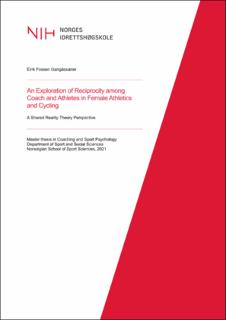An exploration of reciprocity among coach and athletes in female athletics and cycling: A Shared Reality Theory perspective
Abstract
The purpose of the present study was to examine (a) how a shared reality is established, or fails to be established, throughout the sporting partnership between the coach and their athletes; and (b) how experiencing a shared reality, or not, in the relationship is related to the quality of the relationship throughout a 6-month period. Two coaches and three female elite (junior) athletes, making up three separate coach-athlete dyads, were purposefully sampled for this study. Our results show that the participants in this study had already established a moderate degree of shared reality between them prior to the first interview. This level of shared reality was maintained throughout the research period. Further, the results showed that perceived shared reality positively affected the relationship quality. Hence, results indicated that perceived shared reality was more important to the relationship quality than actual shared reality. Frequent communication, shared expectations, and clearly stated goals, seem to be essential for shared reality creation. Additionally, coaches and athletes seem to be sufficiently epistemically motivated but report varying degrees of relational motivation. Conclusively, coaches should be aware of their epistemic power, maintain frequent communication, and try to relate socially to their athletes, if they wish to establish shared realities with their respective athletes, and thus increase the relationship quality.
Description
Masteroppgave - Norges idrettshøgskole, 2021
